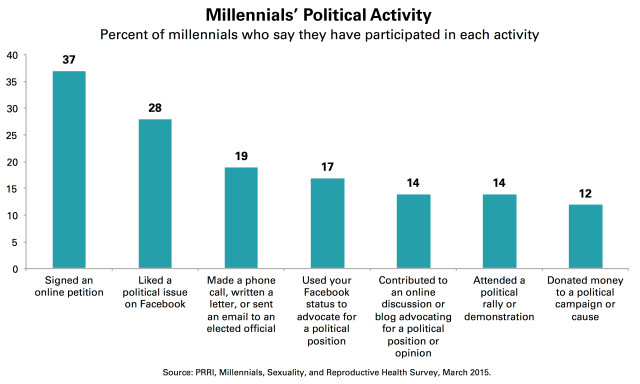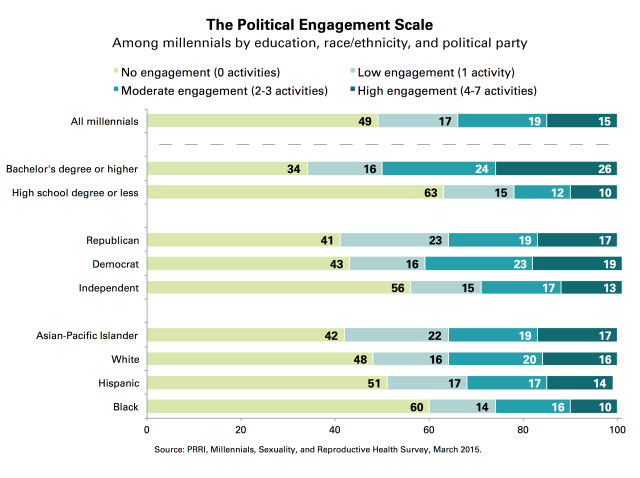Members of the Millennial generation aren’t as politically engaged as many make them out to be, according to findings in PRRI’s millennial report. What’s more, when millennials do participate, they tend to take on activities that don’t take an exorbitant amount of effort—unless typing your name or clicking “like” counts as labor-intensive.
Of the seven political activities provided in the survey, PRRI finds that millennials (age 18-35) are more likely to participate with online activities: signing an online petition (37 percent) or “liking” an issue on Facebook (28 percent). Activities that involve more resources or effort—donating money to a political campaign or cause (12 percent), contributing to an online discussion or blog advocating for a political position (14 percent), or attending a political rally or demonstration (14 percent)—tend to be not as popular among millennials.
To help explain millennials’ political engagement—or lack thereof—PRRI created an additive scale of participation. Nearly half (49 percent) of millennials overall show no political engagement, or report no civil or political participation, while 17 percent show low political engagement, or report performing only one activity. Nineteen percent exhibit moderate political engagement, or report participating in two or three political activities, while just 15 percent have high political engagement, or report participating in four to seven activities.
Although political engagement is low across all subgroups, millennials who are college educated, identify with a political party, and are religiously unaffiliated are among the most likely to be highly politically engaged.
Higher education increases the probability a millennial is politically active. Millennials with a high school degree or less are twice as likely to report no political engagement than millennials with a bachelor’s degree or higher—63 percent vs. 34 percent, respectively.
Unsurprisingly, identifying with a particular party also increases the millennials’ political engagement. About four in ten Republican (41 percent) and Democratic millennials (43 percent) report no political engagement; that number jumps more than 10-percentage points (56 percent) among independent millennials.
Black millennials (60 percent) are the least engaged racial group, compared to Hispanic (51 percent), white (48 percent), and Asian-Pacific Islander (42 percent) millennials.
And surprisingly, the religiously unaffiliated are the most politically engaged “religious tradition” among millennials. One in five (20 percent) unaffiliated millennials fall into the high political engagement category, while about four in ten (43 percent) report no political engagement.
For more, read “How Race and Religion Shape Millennial Attitudes on Sexuality and Reproductive Health.”

